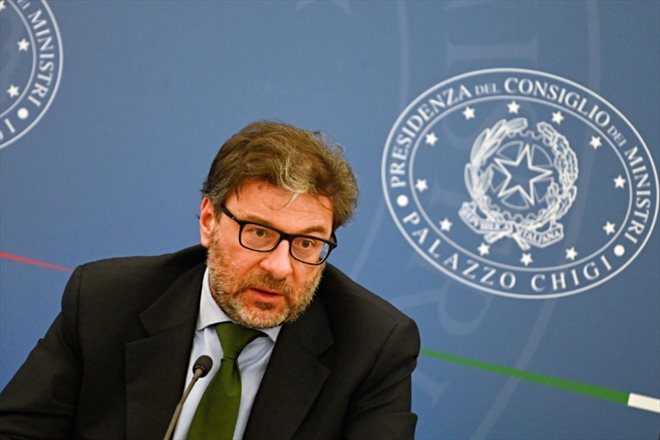Giorgia Meloni during a press conference in Rome, November 11, 2022 (AFP / Alberto PIZZOLI)
The Italian government led by Giorgia Meloni may have corrected the situation by watering down its tax on the “superprofits” of banks, but the damage is done: the confidence of foreign investors, startled by this surprise announcement, has taken a hit.
“The most damaging consequence” will not be the impact on bank profits, but “the higher risk premium” demanded by investors fearful of other interventions of this kind, judged Johann Scholtz, analyst at Morningstar.
The decision of the ultra-conservative government to levy a tax of 40% on the “surplus profits” of banks generated by the increase in interest rates practiced by the European Central Bank (ECB) had caused the collapse of financial securities on Tuesday.
Italian banks have thus seen 9.5 billion euros of capitalization go up in smoke in a single session, a sum well above the gains due to the tax hoped for by Rome.
Thursday, the banking securities of the Milan Stock Exchange continued their timid rebound started the day before, with increases of 1.5% for Intesa Sanpaolo and 0.7% for UniCredit.
The sector was somewhat reassured by the announcement on Tuesday evening of the establishment of a ceiling on the tax, providing that the contribution cannot “exceed 0.1% of total assets” of a bank.
The tax “significantly reduces” the profitability of banks in Italy and represents “about 15%” of their net profits in 2022, however estimated Thursday the financial agency Moody’s, warning that it will have a “negative” effect on the sector rating.
Intesa Sanpaolo CEO Carlo Messina was the only one to declare himself in May ready to accept a possible bank tax, pledging to “respect any decision” of the executive.
– Climate of confusion –
A comment that may have prompted the Meloni government to take action, without however previously warning the banks of this tax, announced Monday in a manifestly improvised manner and in the greatest confusion.
“The haphazard nature of the announcement, with a government that has changed the terms of the tax at least three times in one day, will do little to restore investor confidence,” Scholtz said.

Giorgia Meloni, surrounded by Matteo Salvini (g) and Antonio Tajani (d), at the Senate in Rome, October 26, 2022 (AFP / Alberto PIZZOLI)
“Many investors already view European banks as semi-nationalized institutions,” he added.
The Meloni government, in place since October 2022, is facing its first showdown with the markets.
While Giorgia Meloni was trying to reassure Europe by following the economic policy advocated by her illustrious predecessor Mario Draghi, the former president of the ECB, mistrust began to settle in the markets.
Criticizing the “unfair margins of banks”, the leader of the post-fascist party Fratelli d’Italia defended the tax on Wednesday, serving according to her to “finance support measures for households and businesses” in the face of record inflation.
Italian banks have seen their income generated by interest soar in the wake of the rise in interest rates, without increasing the remuneration of their customers’ current accounts.
– “Soviet measure” –
According to the Italian press, Ms. Meloni made a pact with her Deputy Prime Minister Matteo Salvini, boss of the League (far right), to announce this “anti-rich” measure and thus flatter her electorate.
After removing the “citizenship income” intended for the poorest and blocking the establishment of a minimum wage advocated by the center-left opposition, she wanted to restore her image.
“Banks are easy prey for populists, and their denigration can only attract political support for them,” said Lorenzo Codogno, Italy’s former chief treasury economist.

Giancarlo Giorgetti during a press conference in Rome on February 18, 2022 (AFP / Andreas SOLARO)
This “Soviet-style tax on the excess profits of banks” risks causing “lasting damage to the attractiveness of the Italian economy”, he warned.
The Minister of Economy and member of the League Giancarlo Giorgetti, who had described in June as “demagogic” a possible tax on banks, boycotted Monday evening the press conference announcing this measure.
“An economy minister who does not show up at a press conference on such an occasion gives a very bad image of the country”, decided Francesco Giavazzi, former economic adviser to Mario Draghi, referring to a “damage to the credibility of the country”.
© 2023 AFP
Did you like this article ? Share it with your friends with the buttons below.




